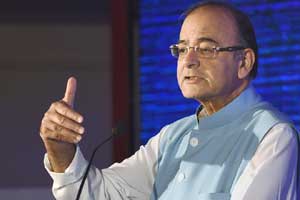Finance Minister Arun Jaitley on Wednesday said the economy, which he believes is growing below its real potential, could add another 1-1.5 percentage point to its current growth rate — 7.4% recorded in the second quarter — if a few variables remain positive.
At an interaction with industry leaders on Goods and Service Tax (GST) here, Jaitley said such an outcome would depend on whether global oil price continues to be favourable, the country gets a normal monsoon next year and whether there would be some revival in global economic growth.
“Our real potential, is more than what we are achieving today. Our emphasis on infrastructure spending continues to increase because oil price remains favourable. If the next monsoon season is at least is normal and some revival of global growth starts taking place, in addition to where we are now (of 7.4% GDP growth), I do not see any difficulty why India cannot improve upon its growth rate by 1- 1.5 percentage point. That brings us close to our real potential,” Jaitley told business leaders while reassuring that the government would continue to carry out structural reforms.
The second quarter growth was better than the 7% recorded in the first quarter but was lower than the 8.4% recorded a year ago.
The minister said he would go ahead with reducing direct tax exemptions and gradually bring down the highest marginal rate of corporate tax down to 25%.
Jaitley also said that one of the key demands of the opposition Congress party for support of the GST Bill in Rajya Sabha—scrapping the 1% origin based tax on inter-state movement of goods—was “eminently resolvable.” However, the other demand of constitutionalising a tax rate cannot be accommodated as tariffs are never specified in the Constitution. Also, the Congress party’s demand to have a dispute resolution mechanism within the proposed GST Council comprising Central and state finance ministers can be accepted to the extent that the Council could decide the modalities of dispute resolution but not actually adjudicate.
Jaitley is keen to roll out GST from next fiscal as this would add to the economic growth prospects. Referring to Congress opposition to the GST Bill, he said that many express only lip sympathy for GST without actually supporting the reform on the floor of the House.
“Let me concede that one of the three congress demands is a fair arguable point. On the 1% additional tax for two years, I told my friends, we are willing to go back to manufacturing states and say that since we have agreed to compensate you for full 5 years, this provision can be done away with. It is a resolvable issue,” said Jaitley. It was at the insistence of states like Gujarat and Tamil Nadu this provision was introduced.
He also said that there cannot be just one GST rate. “There would be a lower rate for commodities (for the common man), a standard rate for most other products and a higher rate for super luxury or sin products. So we cannot put a rate in the Constitution,” the minister said.
“Can tariffs be cast in stone? If there is a drought and you need to raise the tax, can you amend the Constitution? The understanding with the states is that the Council will decide (the tax rate),” said Jaitley.
Arvind Subramanian, chief economic advisor in the finance ministry, said GST would be a buoyant source of revenue over the medium term. The indirect tax reform, along with phasing out corporate tax exemptions and addressing legacy tax issues would lead to a clean, efficient, modern and broad tax regime replacing tax terrorism. GST represents continuity of Indian thinking over the years and is a bipartisan effort, he said.
Mahesh Gupta, President of industry chamber PHDCCI said that while the whole world is going through an economic slow-down, GST would play an important role in boosting India’s growth rate by about 2%. “There could be no better time to implement GST. We request all opposition parties and the government to implement GST on priority,” said Gupta.
IMF managing director Christine Lagarde in a pre-recorded message described GST as India’s trade pact with itself which will boost revenues needed to increase spending on health and education. Without commenting on any recommendations on the tax rate, she said the lesser the rate is, the more efficient it is. Lagarde said GST would help in boosting exports and creating jobs besides aiding the Make in India initiative. IMF, she said, would be keen to help if India needs technical assistance for capacity building.


